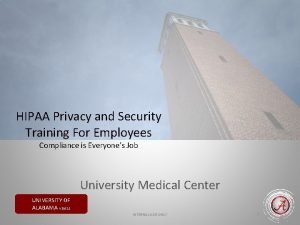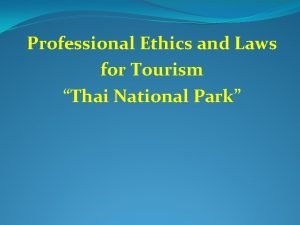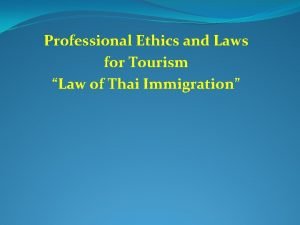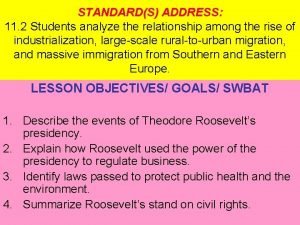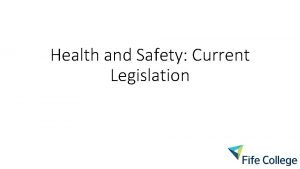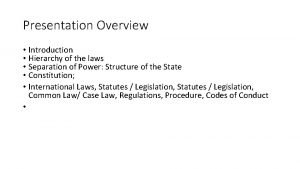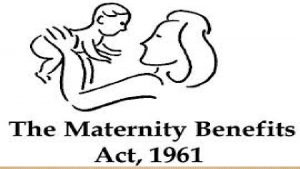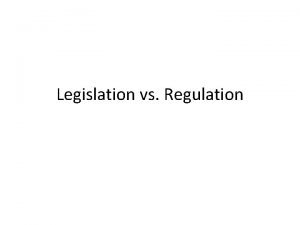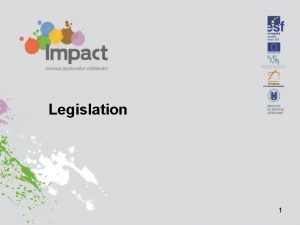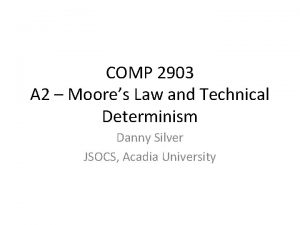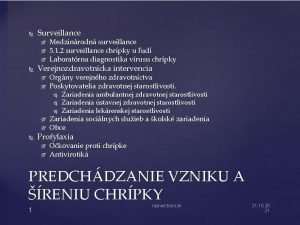COMP 2903 A 12 Privacy Legislation and Surveillance












- Slides: 12

COMP 2903 A 12 – Privacy Legislation and Surveillance Software Danny Silver JSOCS, Acadia University

Daryl Nord, Tiption Mc. Cubbins, and Jeretta Nord Communications of the ACM, August, 2006

Big Brother is Here • Workplace Monitoring and Surveillance Survey of 2001 conducted by the AMA • 75% of major US employers record and/or review: – Email – Telephone – Internnet – Computer files • Twice the 1997 rate

Privacy • What does the term mean? • Webster: – A) The quality or state of being apart from company or observation – B) freedom from unauthorized intrusion • One has a right to privacy in their home • Do they have the same in the work place?

Employer’s Have Real Concerns • 2002 stat: 62% of US workers went online at work for personal reasons • 78% of employers report blatant abuse of organizational internet policies: – – Downloading pirated s/w, pornography Shopping online Personal email, inappropriate email Surfing the web, watch videos, playing games • 10% of US companies have received legal threats because of employee email • Many companies sued for employee actions

Employer’s Are Taking Action • Monitoring employee’s computer and internet use – see table at top of page 53 • 2003: – Over 52% of employers monitor email – 22% have terminated employees for violations of email policy

So what is your right to privacy in the work place? • Constitution / Bill of rights ensures this? • In US rights to privacy in constitution pertain only to state action – not private company work scenarios • Rights to privacy come from Fed legislation and State common law

Electronic Comm. Privacy Act (ECPA) • Covers broad interests of privacy, but limits expectations of employees with respect to employers: – Provider exception – company provides, then the information is theirs – Ordinary course of business exception – the employer has the right to monitor quality control and unauthorized use or misuse of equipment • Can persona voice and email be monitored in the US? – Consent exception – if either party in a conversation consents to use of info – it is OK

State / Provincial Case Law • Employees have tried to use invasion of privacy as a protection in the workplace • Generally two problems: – Employee must have a reasonable expectation of privacy – Mc. Laren v. Microsoft (see p. 55) – Intrusion must be highly offensive to a reasonable person • Social Media Policies: http: //www. blrfurther. com/Social. Media/social-media-a-facebook-policies. html

Monitoring H/W and S/W • Employers have an extensive arsenal of technology they can pay to use • See last page of article: – Multiple employee machines can be simultaneously monitored (email, chat, forums) – Local files can be copied and changes to them logged – Commands to employee computers can be execute remotely (scary!!)

Org. Electronic Comm. Policy • Signed by employees should contain statements that: – Comm. equipment is owned by company – Have the right to monitor – Right to know & keep copies of passwords – Inappropriate comm. are prohibited, including access a website with offensive content – Employees should not voice personal opinions using company comm. technology

Assignment #2 • In Nova Scotia, what is a person’s right to privacy in the work place. • Please investigate and report major findings. • Do you feel that the provisions are adequate so as to protect both the workers and the organizations. • Provide all references • Keep your response to no more than 1. 5 pages • PROOF READ BEFOR SUBMITTING
 Cvs privacy awareness and hipaa training answers
Cvs privacy awareness and hipaa training answers Afi 36-2903 watches
Afi 36-2903 watches National policies related to child health and welfare
National policies related to child health and welfare Tourism legislation and professinal ethics
Tourism legislation and professinal ethics Tourism legislation and professinal ethics
Tourism legislation and professinal ethics Square deal
Square deal Ict ethics and legislation
Ict ethics and legislation Objective of pharmaceutical jurisprudence
Objective of pharmaceutical jurisprudence Health and safety legislation
Health and safety legislation Hierarchy of legislation
Hierarchy of legislation Legis meaning
Legis meaning 2 types of legislation
2 types of legislation Legislation related to maternity benefits
Legislation related to maternity benefits
